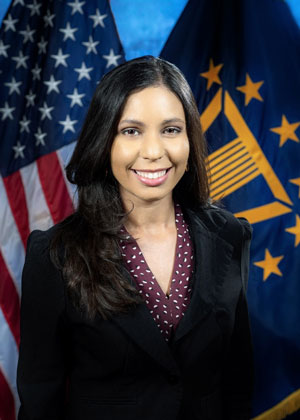VA Homeless Programs
Message from Monica Diaz, Executive Director, VHA Homeless Programs Office
February 2023

It was 1965. United States Marine Jesse Brown was on patrol in Da Nang, Vietnam when he endured the severe combat wounds that would change his life.
Brown returned to Great Lakes Naval Hospital outside of Chicago to recover, but despite his best efforts, his right arm remained partially paralyzed.
He soon learned that his future in the country he served—and nearly sacrificed his life for—would not be easy. The ink had barely dried on the Civil Rights Act of 1964, and Brown found that most job opportunities available to black men required significant manual labor that he would not be able to do with just one functioning arm.
In 1967, Brown received a job offer from Disabled American Veterans (DAV) and began helping Veterans apply for VA benefits. He saw firsthand how these benefits could be life-changing for Veterans.
Nearly 30 years after his injury, Brown testified before the Senate as President Clinton’s nominee for Secretary of VA, declaring, “I believe that the way a society treats its Veterans is an indication of who we are as a nation.”
Brown would go on to make history as the first African-American Secretary for Veterans Affairs—as he preferred to be called—as well as for his leadership in expanding benefits to Veterans, especially those with disabilities and experiencing homelessness.
Today, we owe much to the late Secretary Jesse Brown, including our continuum of care approach and the expanded range of services for Veterans experiencing homelessness that he helped establish during his time leading VA.
Brown’s legacy is just one of the many we celebrate this Black History Month.
But his story is a reminder that though Black Americans have fought for America’s independence selflessly since the Revolutionary War, America has not always returned this independence equally.
The challenges Jesse Brown faced upon returning home—limited job prospects, discrimination, a lack of supportive services—have been all too familiar to millions of other Black Veterans and their families throughout our history.
It is this history of systematic racism, including redlining, segregation, and other discriminatory practices, that has excluded—and continues to exclude—Black Veterans from the full range of opportunities they have earned, including the opportunity to rent and purchase homes.
I encourage everyone to take a few moments to read Homelessness and Black History: Access to Housing, published by The National Alliance to End Homelessness.
And while Black History Month is concluding, our efforts to combat the legacy of systematic racism and homelessness are not. HPO is working with communities around the country to ensure their systems are equitable and responsive to the diverse needs of Veterans disproportionately impacted by homelessness, including Black, American Indian/Alaska Natives, and Hispanic Veterans.
As part of our commitment to increasing equity and accessibility for all Veterans, we must also understand and respond to the needs of one of our fastest-growing populations: aging Veterans.
On this month’s episode of Ending Veteran Homelessness, host Shawn Liu discusses how HPO is helping Veterans age with the services they need in the locations they are most comfortable.
Veteran William Peterson’s experience with VA’s Medical Foster Home Care program emphasizes how critical these program enhancements are—and how grateful our Veterans are for the dedication and commitment of VA staff and our partners.
We will continue to build upon the strategies that led to this milestone, and in doing so, grow closer to realizing Jesse Brown’s vision of becoming a nation that treats every Veteran with the best care and resources we have to offer.
















